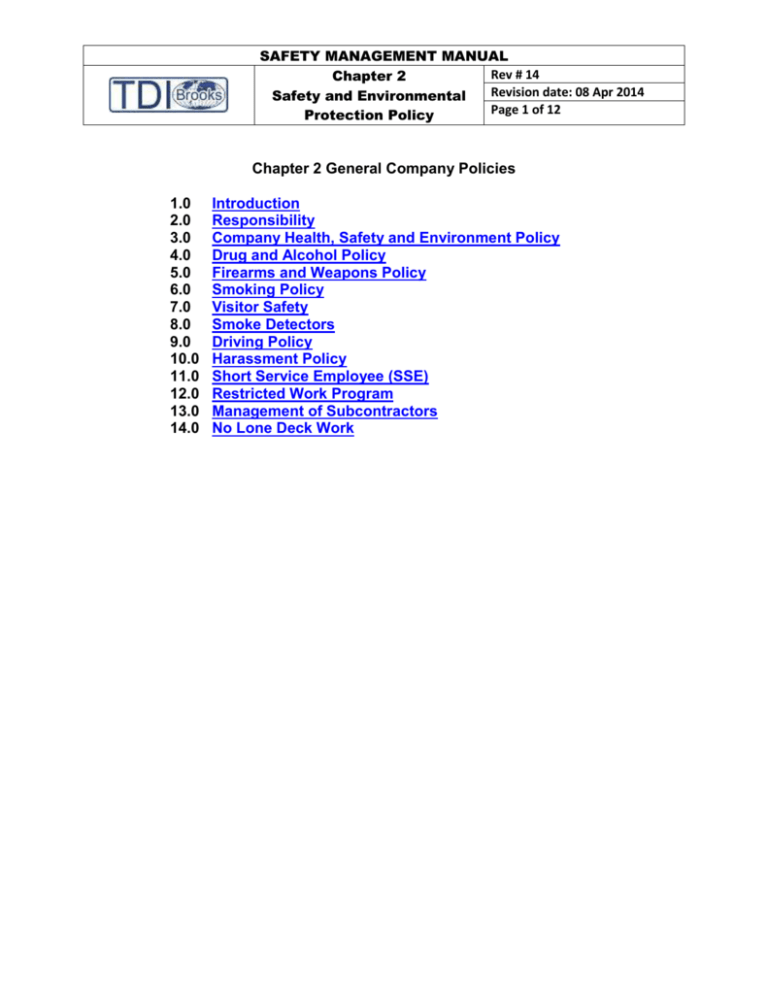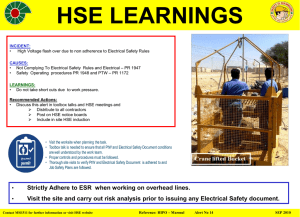
SAFETY MANAGEMENT MANUAL
Rev # 14
Chapter 2
Revision date: 08 Apr 2014
Safety and Environmental
Page 1 of 12
Protection Policy
Chapter 2 General Company Policies
1.0
2.0
3.0
4.0
5.0
6.0
7.0
8.0
9.0
10.0
11.0
12.0
13.0
14.0
Introduction
Responsibility
Company Health, Safety and Environment Policy
Drug and Alcohol Policy
Firearms and Weapons Policy
Smoking Policy
Visitor Safety
Smoke Detectors
Driving Policy
Harassment Policy
Short Service Employee (SSE)
Restricted Work Program
Management of Subcontractors
No Lone Deck Work
SAFETY MANAGEMENT MANUAL
Rev # 14
Chapter 2
Revision date: 08 Apr 2014
Safety and Environmental
Page 2 of 12
Protection Policy
Revision/ Review Log
Revision Date
Approved by
Reviewed by
11 January 2010
Dr. Jim Brooks
HSE Manager:
Sue McDonald
Dr. Jim Brooks
Dr. Bernie Bernard
HSE Manager:
Russell Putt
Dr. Jim Brooks
Dr. Bernie Bernard
Port Captain:
Capt. Pat Fallwell
Dr. Jim Brooks
Dr. Bernie Bernard
Dr. Jim Brooks
Dr. Bernie Bernard
Dr. Jim Brooks
Dr. Bernie Bernard
Goal of zero accidents and no
harm to personnel or environment
added to HSE statement
Dr. Jim Brooks
Dr. Bernie Bernard
Dr. Jim Brooks
Dr. Roger Fay
Capt. Pat Fallwell
Reasonable cause testing form to
be completed before testing
Dr. Jim Brooks
Dr. Bernie Bernard
Dr. Jim Brooks
Dr. Roger Fay
Capt. Pat Fallwell
Dr. Jim Brooks
Ms. Gail Mills
Ms. Kathleen Nease
Dr. Jim Brooks
Mr. Pete Tatro
Dr. James Howell
Dr. Jim Brooks
Mr. Pete Tatro
Dr. James Howell
Annual drug test requirement
removed, random testing for all
employees, including non-US
citizens
Drug and alcohol policies in
Employee Manual and SMM
merged. All new and offshore
employees must sign an
acknowledgement and release of
drug and alcohol testing results
No one may work alone on deck
Dr. Jim Brooks
Mr. Pete Tatro
Dr. Jim Brooks
Mr. Pete Tatro
Charlie Emerson
Drug and alcohol policy modified
to incorporate Vanuatu
requirements
Dr. Jim Brooks
Mr. Pete Tatro
Dr. Jim Brooks
Mr. Pete Tatro
Bloodborne pathogens moved to
new SOP
Revision #5
15 October 2010
Revision Details/ Proposal
Notes
Changed to electronic format
Revision #6
20 May 2011
Revision #7
12 Aug 2011
Revision #8
03 May 2012
Revision #9
03 May 2012
Revision #10
27 August 2012
Revision #11
12 February 2014
Revision #12
28 March 2014
Revision #13
08 April 2014
Revision #14
Bloodborne pathogens and
subcontractor evaluation sections
added.
SAFETY MANAGEMENT MANUAL
Rev # 14
Chapter 2
Revision date: 08 Apr 2014
Safety and Environmental
Page 3 of 12
Protection Policy
1.0
Introduction
This chapter describes Company policies for TDI-Brooks’ vessels. These vessels
operate in compliance with applicable international, Vanuatu and U.S. Coast Guard
guidelines as well as best practices.
2.0
Responsibility
The president of TDI-Brooks is ultimately responsible for the safety, and health of his
employees and the protection of the environment. All managers and supervisors must
take an active role in TDI-Brooks’ safety and environmental programs by initiating
preventive measures to control hazards associated with TDI-Brooks activities. However,
safety is the responsibility of all TDI-Brooks employees.
3.0
Company Health, Safety, and Environment Policy (HSE)
TDI-Brooks is committed to providing its employees, contractors, clients, and visitors a
safe environment in which to work. TDI-Brooks is also committed to the protection of the
environment and strives to meet environmental compliance (see the following policy
statement).
SAFETY MANAGEMENT MANUAL
Rev # 14
Chapter 2
Revision date: 08 Apr 2014
Safety and Environmental
Page 4 of 12
Protection Policy
TDI-Brooks International’s
Commitment to the Health and Safety of Employees
and Protection of the Environment
It is the goal of TDI-Brooks International to conduct each project with zero accidents and no
harm to personnel or the environment.
TDI-Brooks International is committed to providing its employees, contractors, clients, and
visitors a safe environment in which to work. Safety is the business and responsibility of every
employee and can be better achieved through proper engineering, education, training, protective
equipment, and enforcement of safety rules. TDI-Brooks International is responsible for providing the
proper equipment, tools, training, supervision, and policies to their employees to meet the Company’s
commitment to a safe work environment. Every employee is responsible for understanding and
practicing appropriate safety procedures for their own protection, as well as others. TDI-Brooks
International is also committed to the protection of the environment.
In order to meet this commitment, TDI-Brooks International follows U.S. and international
standards and fosters an attitude consistent with the goals of safe and healthy operations, as well as
environmental preservation. TDI-Brooks International also maintains a Health, Safety and
Environment (HSE) system within its organization. The HSE system includes extensive policy and
guideline documentation based on industry standard guidelines, training opportunities, adequate
equipment and supplies, and trained HSE personnel. The main objectives of the HSE system include:
safety and loss prevention; mitigating occupational hazards; trained personnel; ensuring that
employees are provided with appropriate personal protective equipment (PPE); a safe, comfortable
working environment; negligible adverse environmental impact; and a system of investigating
accidents and taking corrective actions.
TDI-Brooks International also has a strict “zero tolerance” policy for the possession or use of
any controlled substance, as well as alcohol, while aboard their vessels. The Company has a
drug/alcohol-testing program that includes random testing.
TDI-Brooks International is committed to providing a safe working environment for its
employees, contractors, and clients. We are open to comments and suggestions from our employees,
contractors, and clients in order to improve our HSE system. The HSE system is designed to be
flexible in order to meet the needs of our employees, contractors, and clients.
President
SAFETY MANAGEMENT MANUAL
Rev # 14
Chapter 2
Revision date: 08 Apr 2014
Safety and Environmental
Page 5 of 12
Protection Policy
4.0
Drug and Alcohol Policy
It is the policy of this company to maintain a work environment that is safe for employees and
conducive to attaining high work standards. As part of this policy, no intoxicating beverages,
illegal drugs, paraphernalia or equipment related to illegal drug use are allowed aboard vessels,
in offices or other work locations of the company.
In accordance with U.S. Coast Guard and the Vanuatu Administration, TDI-Brooks has a "ZERO
TOLERANCE" for possession or use of any illegal drugs. The policies of these organizations are
very similar. In instances where they overlap, the stricter of the two shall apply.
TDI-Brooks International prohibits alcohol/ illegal drug possession and consumption while
onboard a vessel. Any crewman or other TDI-Brooks employee found in possession of alcohol/
illegal drugs is subject to immediate termination.
4.1 Definitions
Chemical Test- means a scientifically recognized test, which analyzes an individual’s
breath, blood, urine, saliva, bodily fluids, or tissues for evidence of dangerous drug or
alcohol use.
Crew member- means an individual who is on board a vessel acting under the authority
of a license, certificate of Registry, or merchant mariner’s document issued by the flag
state.
Dangerous Drug- means a narcotic drug, controlled substance, and marijuana.
Non-crew member- scientific personnel, surveyors and all personnel not required to
hold an STCW certificate who are working on board the vessel.
4.2 Pre-Employment and Random Testing
Crew members and all other TDI-Brooks employees are required to pass a pre-employment
drug and alcohol test before working offshore.
Crew members and all other TDI-Brooks employees are subject to random testing based on the
flag state requirements. The current testing rates of 25% of crew for US flagged vessels will
be increased to match the 50% rate for Vanuatu flagged vessels. Random testing will be
done by geographic locations of the vessel operations using appropriate random selections
methods. (VMB #115 Sec 2.2)
4.3 Reasonable Cause Testing
Reasonable cause testing will be undertaken whenever a supervisor determines that there is a
reasonable cause to believe that an employee is under the influence of drugs or alcohol. The
supervisor will base their decision on physical, behavioral, and performance issues. Any nearmisses, accidents, or suspicious behavior can trigger a drug and alcohol test.
SAFETY MANAGEMENT MANUAL
Rev # 14
Chapter 2
Revision date: 08 Apr 2014
Safety and Environmental
Page 6 of 12
Protection Policy
The employee’s direct supervisor will complete the Reasonable Cause Testing form before the
test is performed. The Reasonable Cause Testing form is located on the ship web pages on the
SMM Forms Only page.
The fact that a reasonable cause test was conducted and any refusals to test must be
entered into the vessel’s official logbook. If an employee refuses to comply with reasonable
cause testing, that employee will be immediately removed from any safety sensitive position and
may face termination.
If the crew/vessel is in a location that an employee cannot be transported to an approved clinic
or hospital for testing, reasonable cause testing may be conducted aboard the vessel and must
be administered by a DOT certified collector. However, the testing may not be conducted by the
person requesting it. Shore based employees will be transported to the nearest approved
testing facility.
The HSE Manager is responsible for decisions regarding drug and alcohol testing policies and
procedures. On vessels at sea, the Party Chief or the HSE Officer on board may make the
decision whether or not to conduct offshore testing for reasonable cause.
The Designated Employee Representative of TDI-Brooks is responsible for managing drug and
alcohol testing for all TDI-Brooks employees. Any reasonable cause testing will be reported to
the DER and upper management as soon as possible. TDI-Brooks has contracted the services
of an off-site Medical Review Officer to review all drug test results.
4.4
If a Drug Test is Positive
Vanuatu Administration’s drug and alcohol policy is documented in the following:
Vanuatu Maritime Act CAP 131 Sec 137 Drunkenness, Neglect of Duty
Vanuatu Shipping Articles Item 12 Possession of dangerous weapons, narcotics,
contraband articles or alcoholic beverages
Vanuatu Maritime Bulletin (VMB) #115 Use of Drug Testing Consortiums for
Mandatory Testing
If the results of a drug test for a crew member are verified positive, the employee will be
immediately removed from performing safety-sensitive functions and may not return to safety
sensitive functions without completing the return to duty process.
Return to Duty:
USA- 49 CFR Part 40.23(a) and 40.305
Vanuatu- VMB #115 Sec 2.5
The positive results of crew members must be reported to the appropriate Maritime
Administration. If an MRO verifies a lab confirmed positive report, the MRO shall report the
positive test result to the vessel operator and to Vanuatu Maritime Services Ltd. (VMB #115 Sec
3.2)
SAFETY MANAGEMENT MANUAL
Rev # 14
Chapter 2
Revision date: 08 Apr 2014
Safety and Environmental
Page 7 of 12
Protection Policy
The employer is responsible for reporting positive results of crew members to the USCG. (46
CFR Part 16 16.201(c)).
4.5 Searches
Entry into or upon any vessel, office or other work location of the company is conditioned upon
the company's right to search the person, personal effects and vehicle of any entrant for illegal
drugs, intoxicating beverages, firearms, or possession of unauthorized property or equipment.
From time to time and without prior warning, searches by authorized company representatives
may be made of anyone entering or on company premises, including vessels, or company
vehicles and such searches may be made of employees as well as employees of contractors
having business with the company. This search may include lockers and rooms if appropriate.
Searches on US Flagged vessels are conducted according to 33 CFR 104.265(e)(2) and 33
CFR 105(e)(2).
When appropriate, such items discovered through these company searches may be taken into
custody and may be turned over to the proper authorities. Violation of the above policy or
refusal to submit to a search will be cause for disciplinary action up to and including immediate
termination.
4.6 Testing Facilities
Only certified facilities will be used to analyze all drug and alcohol tests. Should a test need to
be administered in a foreign country, every effort will be made to assure that standard chain-ofcustody protocols are followed to ensure the integrity of the tests.
4.7 Acknowledgement and Release Form
All employees who work offshore are required to sign a copy of the Acknowledgement and
Release Form regarding the Drug and Alcohol Policy as a condition of employment.
4.8
Resources for Rehabilitation
At request of the employee, information on resources may be provided for the recovery of drug
and alcohol abuse. Please contact the Quality Management Representative if you are interested
in these resources.
5.0
Firearms and Weapons Policy
Firearms or any other type of weapons are not permitted aboard the vessel. The exception to
this policy is if the vessel is in a region of the world that the threat of violence necessitates the
presence of armed guards.
6.0
Smoking Policy
SAFETY MANAGEMENT MANUAL
Rev # 14
Chapter 2
Revision date: 08 Apr 2014
Safety and Environmental
Page 8 of 12
Protection Policy
Smoking is permitted only in designated exterior areas. The Master defines the designated
areas. Smoking is not permitted in the interior of the vessel.
7.0
Visitor Safety
No visitors are permitted on the vessel without permission of the Master or officer on watch. All
visitors will receive a safety orientation, vessel tour, and an identification badge.
Visitors are not permitted to roam about the vessel without an escort.
8.0
Smoke Detectors
Tampering with smoke detectors on the vessel is not permitted. Doing so may result in
immediate dismissal.
9.0
Driving Policy
All drivers operating a vehicle for TDI-Brooks business must have a valid driver license and
obey state, county, and city traffic regulations. Drivers also shall not abuse the vehicle. They
should plan trips so that appropriate schedules can be maintained, exhibit courtesy in all driving
operations, yield right-of-way when in doubt, and keep right to allow faster traffic to pass.
Supervisors shall not schedule runs nor permit or require the operations of any motor vehicle
between locations in such a period of time that will require the vehicle to be operated at speeds
greater than those prescribed by the laws in the area in which the vehicle is being operated. The
following are the Company’s driving policies and apply to company vehicles and personal
vehicles used for company business.
Only company employees or persons authorized by the supervisor will be permitted to
ride in TDI-Brooks vehicles.
All state, local, and company speed limits shall be observed when operating a
company vehicle.
Regardless of legal speed limits, company vehicles may not exceed the posted limits
or the following maximum speed limits:
o Interstate and state highways, 65 mph or legal limit
o County highways, 55 mph or legal limit
o Gravel or dirt roads, 45 mph
The driver and passengers must use seat belts when in company vehicles.
Drivers will not drive under the influence of alcohol, illegal drugs, or legal drugs that
impair alertness.
Alcohol, illegal drugs, firearms, or contraband items are not permitted in company
vehicles.
The use of cell phones while driving is not permitted. Safely pull off the road to talk on cell
phones.
SAFETY MANAGEMENT MANUAL
Rev # 14
Chapter 2
Revision date: 08 Apr 2014
Safety and Environmental
Page 9 of 12
Protection Policy
10.0
Harassment Policy
It is the Company’s position that employees should be able to work in an environment free of
sexual harassment. Sexual harassment is a form of misconduct that undermines the
employment relationship. No employee, either male or female, should be subjected verbally or
physically to unsolicited and unwelcome sexual overtures or conduct.
Sexual harassment refers to behavior that is not welcome, personally offensive, and debilitates.
Behavior that amounts to sexual harassment will result in disciplinary action, including
dismissal.
10.1
Definition
TDI-Brooks has adopted, and its policy is based on, the definition of sexual harassment set forth
by the Equal Employment Opportunity Commission (EEOC). The EEOC defines sexual
harassment as unwelcome sexual advances, requests for sexual favors, and other verbal or
physical conduct of a sexual nature when:
Submission to such conduct is made either explicitly or implicitly a term or condition of
your employment;
Submission to or rejection of such conduct by you is used as the basis for employment
decisions affecting you; and /or
Such conduct has the purpose or effect of unreasonably interfering with your work
performance or creating an intimidating, hostile, or offensive working environment.
10.2
Company’s Responsibility
TDI-Brooks wants its employees to have a work environment free of sexual harassment by
management personnel, coworkers, and others with whom an employee must interact in the
course of their work. Sexual harassment is specifically prohibited as unlawful and as a violation
of Company policy. TDI-Brooks is responsible for preventing sexual harassment in the
workplace, taking immediate corrective action to stop sexual harassment in the workplace, and
promptly investigating any allegation of work-related sexual harassment.
10.3
Compliant Procedure
Any suspicions of sexual harassment in the workplace should be reported immediately to the
HSE Manager or to any other member of the Company’s management. All allegations of sexual
harassment will be quickly investigated. Confidentiality of all individuals involved will be
protected against unnecessary disclosure. When the investigation has been completed, the
affected employees will be informed of the outcome of that investigation.
10.4
Retaliation Prohibited
TDI-Brooks will permit no employment-based retaliation against anyone who brings a complaint
of sexual harassment or who speaks as a witness in the investigation of a complaint of sexual
harassment.
SAFETY MANAGEMENT MANUAL
Rev # 14
Chapter 2
Revision date: 08 Apr 2014
Safety and Environmental
Page 10 of 12
Protection Policy
11.0
Short-Service Employee (SSE)
Due to the nature of the work undertaken by TDI-Brooks, short-service employees (SSEs) are
frequently hired based upon the needs of a particular work effort. Consequently, TDI-Brooks has
developed a Short Work Service Program to address the issues associated with the safety and
health of SSEs. This program assures that SSEs receive the necessary training that will ensure
their health and safety, as well as the health and safety of those working with SSEs.
An SSE is an individual who (1) has not worked more than six (6) months of service with
TDI-Brooks or (2) has not worked more than twelve (12) months of appropriate
experience that ended within the previous 12 months.
The TDI-Brooks SSE program includes the following:
An SSE will work with a qualified mentor (a current employee who is fully trained and
qualified with respect to their job and HSE issues). This mentor will ensure that the
SSE is only performing tasks for which they have received the proper training.
The mentor and a supervisor will evaluate the performance and progress of the SSE
and decide when the SSE is fully qualified for the job.
An SSE will be clearly identified to the crew, either by wearing a different colored hard
hat or a hard hat that is marked to differentiate him as a SSE in PPE required zones.
SSE personnel are required to attend and participate in the TDI-Brooks orientation
program described in Section 6.4 of this document.
SSE personnel will also receive training required by all crew members on the vessel
(i.e., Sea Survival Training, basic first aid and CPR).
SSE personnel will not be assigned supervisory duties or placed in a safety sensitive
position until adequate training and experience has been achieved.
An employee designated as an SSE will remain so for a minimum of six (6) months,
depending upon the nature of the job and individual performance.
12.0
Restricted Work Program
TDI-Brooks’ policy is to assure its employees that every effort will be made to protect their
employment should they suffer an illness or injury. This policy will make provisions with injured
or ill employees so that they can either work in their original position on a modified schedule or
an alternate position with the same restrictions to their work hours, volume, and /or tasks. An
injured/ill employee will be allowed to participate in a modified or alternate work program for
seven (7) days. After the initial seven (7) day period, a seven (7) day extension may be
requested in writing to the vessel’s HSE representative or the TDI-Brooks HSE Manager.
As defined in this manual, modified or alternate work duty is: Any job, task or function or some
combination which are meaningful and productive and can be performed by a worker who has
suffered from a diminished capacity, temporarily or permanently due to a work related accident,
and without risk or re-injury to themselves or others.
SAFETY MANAGEMENT MANUAL
Rev # 14
Chapter 2
Revision date: 08 Apr 2014
Safety and Environmental
Page 11 of 12
Protection Policy
13.0
Management of Subcontractors
The purpose of this policy is to provide guidance on HSE requirements to sub-contractors.
A sub-contractor who works on TDI-Brooks’ property or under TDI-Brooks’ prevailing influence
must conduct their activities in a manner that is consistent with safe, healthy, and
environmentally friendly operating practices and in accordance with all the applicable health,
safety, and environmental rules and regulations.
This policy applies to all sub-contractors who are expected to perform work or provide services
for TDI-Brooks.
13.1
Requirements
The HSE program and record of each sub-contractor will be considered by TDI-Brooks’ during
the selection process. At TDI-Brooks’ request, subcontractors may be required to provide their
current HSE incident rates and/or other information as determined. It is the primary
responsibility of each sub-contractor to provide a safe and healthy workplace for their
employees. All sub-contractors must perform their work in accordance with all applicable local
and national government regulations, as well as with the HSE policies and procedures of TDIBrooks or TDI-Brooks’ clients. All sub-contractors will provide their employees with appropriate
medical examinations, drug screening, personal protective equipment (PPE), and survival at
sea training before beginning work.
All sub-contractors are responsible for ensuring that their equipment is in proper working
condition and that any unsafe conditions will be corrected as soon as possible.
All sub-contractors will conduct safety meetings for their employees or have their employees
attend TDI-Brooks safety meetings, as well as monitor their work activities to help ensure safe
working practices and conditions. The sub-contractor must document each safety meeting,
stating the time, place, and subject discussed, and include each employee’s signature. All subcontractors will notify a TDI-Brooks supervisor immediately about all accidents involving their
employees on TDI-Brooks’ property or under TDI-Brooks’ prevailing influence. All subcontractors will comply with TDI-Brooks’ alcohol and drug policy when performing work for TDIBrooks or its clients. All sub-contractors must comply with TDI-Brooks’ policy for sub-contractors
and communicate it to their employees.
TDI-Brooks reserves the right to audit/ inspect the sub-contractors’ HSE program,
equipment, and operations before and during performance of the work.
13.2 Subcontractor Evaluation
TDI-Brooks International will evaluate subcontractors based on their responses to our
subcontractor survey.
13.3 Implementation
SAFETY MANAGEMENT MANUAL
Rev # 14
Chapter 2
Revision date: 08 Apr 2014
Safety and Environmental
Page 12 of 12
Protection Policy
Local TDI-Brooks management is responsible for implementing this policy for each of its
subcontractors. If a sub-contractor violates this policy, then the sub-contractor will take prompt
action to correct such violation to the satisfaction of TDI-Brooks management.
Violation of TDI-Brooks’ policy for sub-contractors, or any applicable policy of a TDI-Brooks
client, or any applicable government law or regulation may be cause for immediate removal and
revocation of access by the offending person to any TDI-Brooks or client property.
14.0
No Lone Deck Work
During normal deck operations, there are several people observing and participating in the
work. However, some tasks must be performed off hours.
When performing deck operations during these times, the worker must have a buddy go with
him and they must have radio communication with the bridge.







